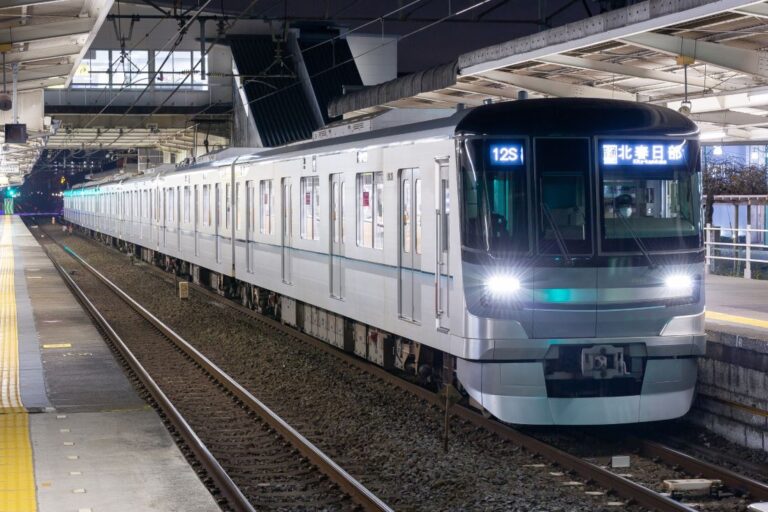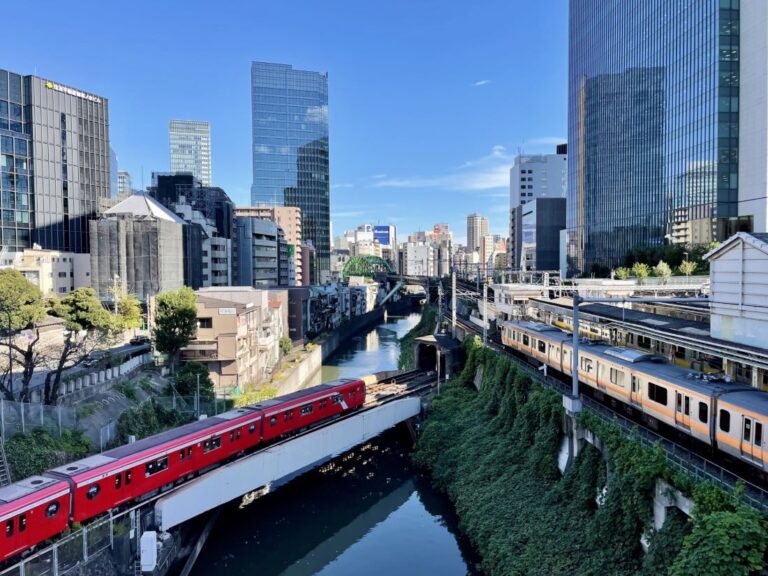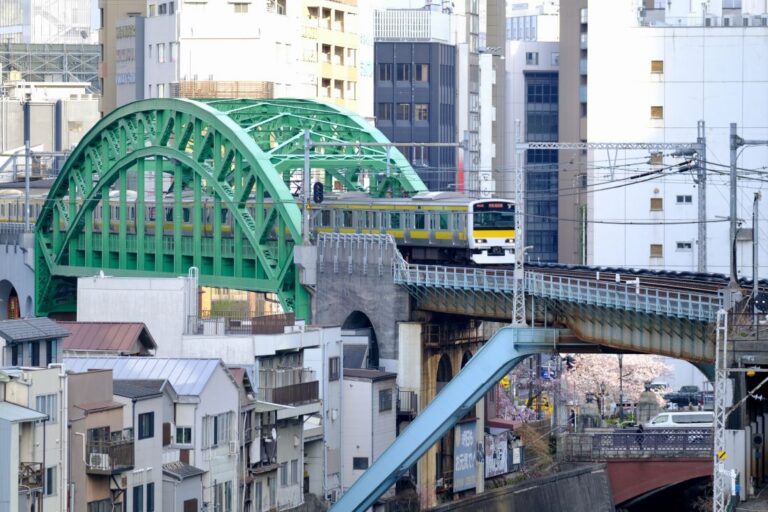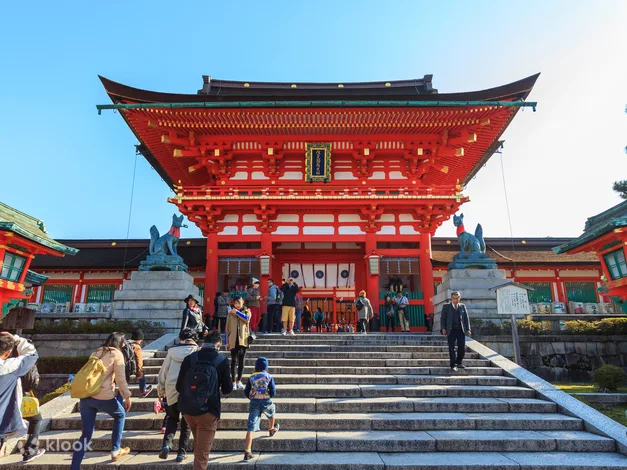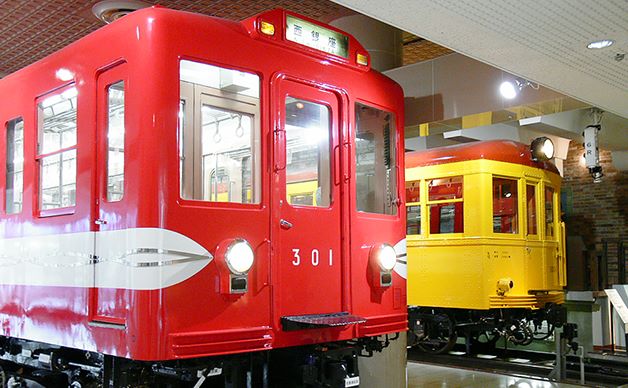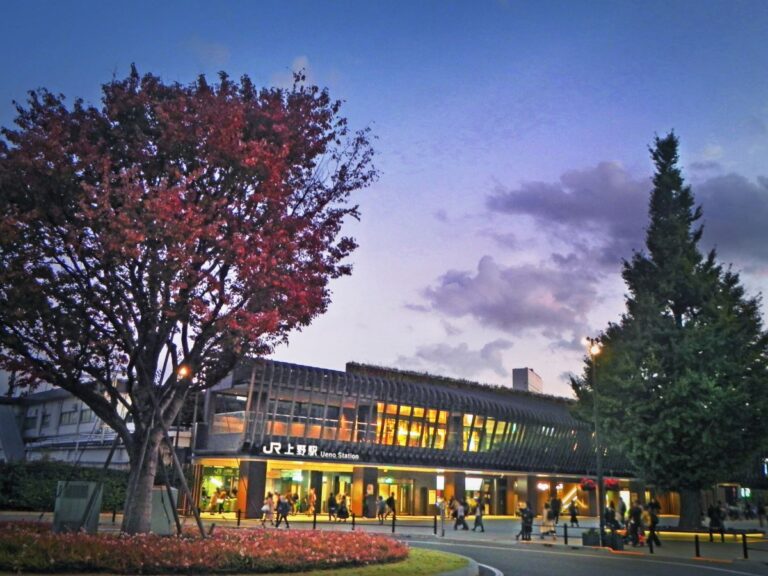If you’re heading to Tokyo’s Odaiba area, you’ve probably heard of the Yurikamome Line. This is known unimaginatively known as an automated guideway transit service (but you can just call it a robot train which sounds way cooler).
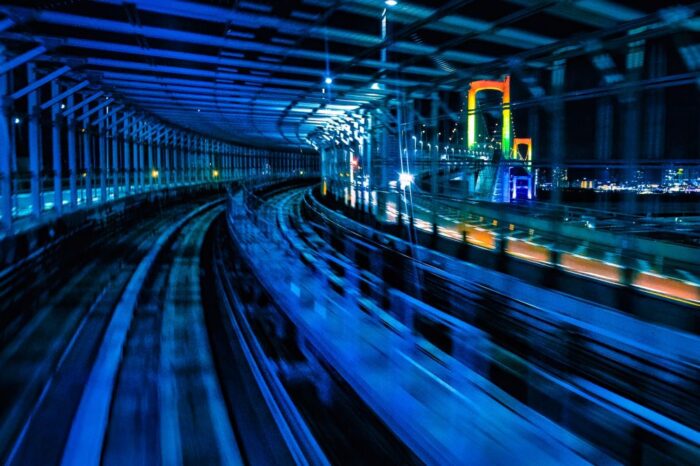
It connects the Tokyo city center to the Odaiba waterfront area, passing over the iconic Rainbow Bridge along the way. The Yurikamome Line is a popular mode of transportation for both tourists and Tokyoites.
The Line is operated by Yurikamome, Inc. and has been in service since November 1995. It runs from Shimbashi Station to Toyosu Station, with stops at several stations along the way, including Odaiba-kaihinkoen Station, which is near the popular Odaiba beach.
A unique feature of the Yurikamome Line is that it is fully automated, with no staff on the trains or in the stations.
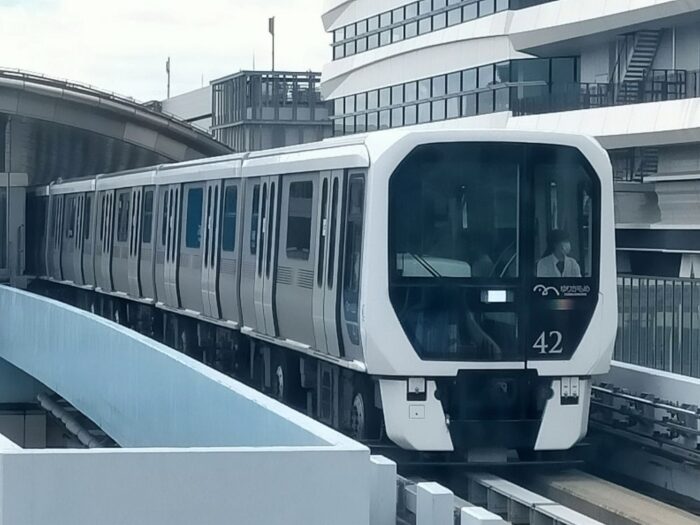
This makes for a convenient and efficient travel experience, as there are no delays or disruptions caused by human error.
Maps
Yurikamome provides some good English maps that help give you a visual idea of the line.
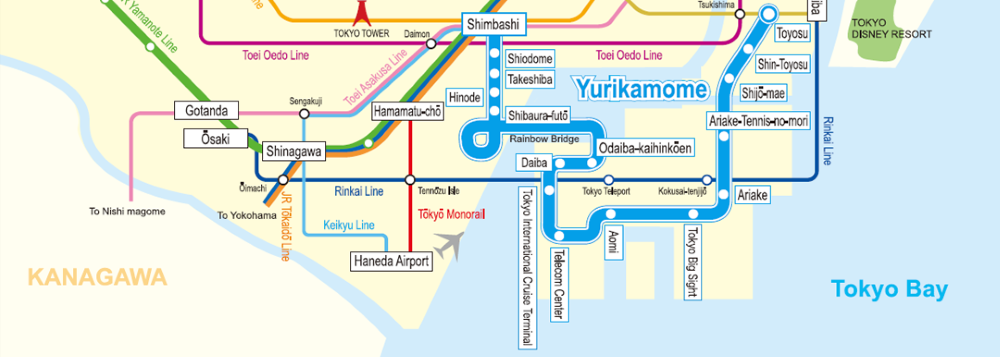
And this map which can also be viewed on the Yurikamome wedsite is also good to give you an idea of the attractions on the line
Route and Stations
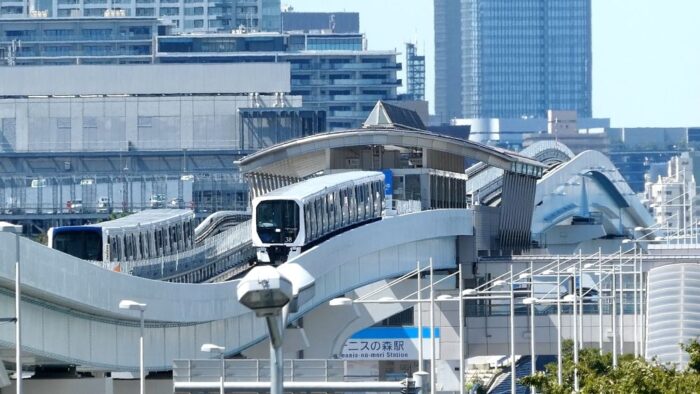
The Line runs from Shimbashi to Toyosu, via the man-made island of Odaiba in Tokyo, Japan and covers a total distance of 14.7 km and has 16 stations. The totally automated line is a popular mode of transportation for both tourists and Tokyoites as it offers a scenic view of Tokyo Bay and the Rainbow Bridge.
The Line starts from Shimbashi Station and then passes through the following stations with their connecting lines listed if an
| Station No. | Station Name | Connecting Lines |
|---|---|---|
| U01 | Shimbashi | JR Yamanote Line, JR Keihin-Tohoku Line, JR Tokaido Line, Tokyo Metro Ginza Line, Tokyo Metro Asakusa Line |
| U02 | Shiodome | Toei Oedo Line, Toei Asakusa Line |
| U03 | Takeshiba | |
| U04 | Hinode | |
| U05 | Shibaura-futo | |
| U06 | Odaiba-kaihinkoen | |
| U07 | Daiba | |
| U08 | Tokyo International Cruise Terminal (former name: Fune-no-kagakukan) | |
| U09 | Telecom Center | |
| U10 | Aomi | |
| U11 | Tokyo Big Sight (former name: Kokusai-tenjijo-seimon) | Rinkai Line |
| U12 | Ariake | |
| U13 | Ariake-Tennis-no-mori | |
| U14 | Shijo-mae | |
| U15 | Shin-toyosu | |
| U16 | Toyosu | Tokyo Metro Yurakucho Line, Tokyo Metro Hibiya Line |
Along with being fully automated the trains also run on rubber tires, which makes for a smooth and quiet ride. All stations are wheelchair accessible, complete with elevators and multi-functional restrooms.
The line also offers ticket types, including one-day passes and discounted tickets for children and seniors.
Fares and Tickets
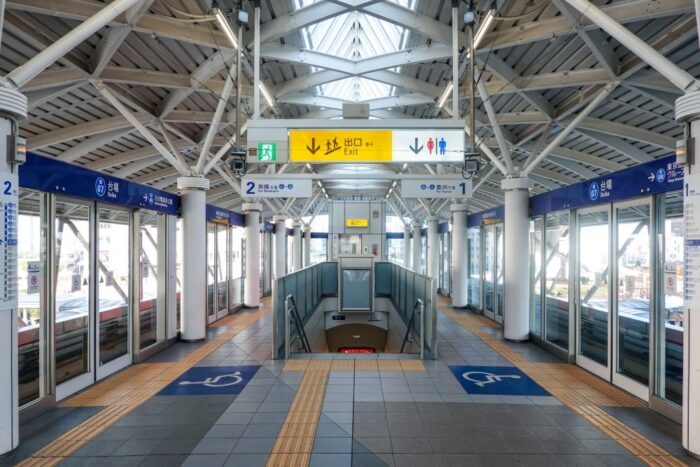
When it comes to riding the Yurikamome Line, there are a few things you need to know about fares and tickets. Here’s a rundown of everything you need to know:
- The starting fare for a ride on the Yurikamome Line is 190 yen. Depending on your destination, the fare can go up to 390 yen.
- If you plan on using the Yurikamome Line frequently during your stay in Tokyo, a one-day pass might be a good option for you. The one-day pass costs 820 yen and allows you to ride the Yurikamome Line as many times as you want in a single day.
- If you have an IC card such as Suica, Pasmo, or Manaca, you can use it to pay for your ride on the Yurikamome Line. Simply tap your card on the card reader at the ticket gate.
- If you have a disability, you might be eligible for a discount on your fare. The Yurikamome Line offers discounts for passengers with disabilities. Contact the Yurikamome Line for more information.
Note that the Yurikamome Line does not offer a monthly pass. If you plan on using the Yurikamome Line frequently, your best bet is to purchase a one-day pass or use an IC card.
Overall, the fares and tickets for the Yurikamome Line are fairly straightforward. Just make sure you have enough yen or an IC card with enough funds to cover your fare, and you’ll be good to go.
Service Frequency and Operating Hours
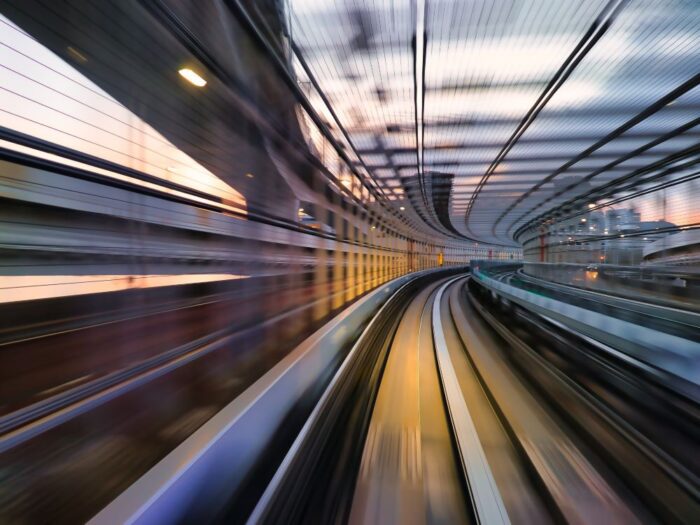
The Line operates from early morning until midnight, with the first train starting around 5:00 am and the last train ending around 24:00 midnight.
The operating hours may vary slightly depending on the station and the day of the week, so it’s always best to check the official website or timetable for the latest information.
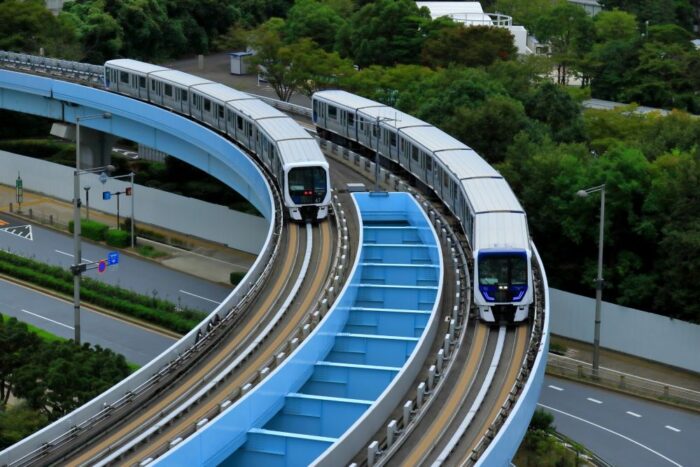
The frequency of the trains also varies depending on the time of day and the day of the week. During peak hours, trains run more frequently to accommodate the higher volume of passengers.
Crowded hours are from 7:00 to 9:00 in the morning and from 17:00 to 20:00 in the evening, so if you can avoid traveling during these times, you’ll have a more comfortable ride.
Here’s a breakdown of the Yurikamome Line service frequency:
| Time of Day | Frequency |
|---|---|
| Early morning | Every 10-15 minutes |
| Daytime | Every 5-10 minutes |
| Evening | Every 10-15 minutes |
Line Features
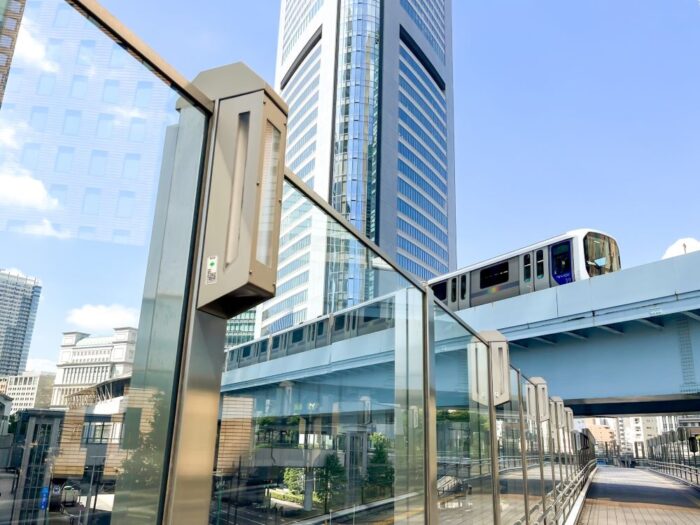
The futuristic transit system offers more than just a way to get around Tokyo. Here’s a few of the top features and attractions that make this driverless train worth riding:
- Amazing Views: The Yurikamome Line offers some of the best views of Tokyo Bay and the city skyline. The ride across the Rainbow Bridge is a highlight, with stunning sweeping views of the city and waterfront. And because there is no drive you can sit right up the front and enjoy the view from the front window.
- Architecture: The Line is surrounded by sleek, modern architecture, including the iconic Fuji TV building and the futuristic Telecom Center.
- Odaiba: Takes you to the heart of Tokyo’s entertainment and shopping district, Odaiba. Here, you’ll find everything from high-end shopping malls to amusement parks and museums.
- Driverless Technology: Fully automated and driverless, making it a unique and futuristic experience. The trains are guided by the side walls and run on rubber-tired wheels on elevated concrete tracks.
- Convenience: Gives you easy access to some of Tokyo’s top attractions, including Odaiba Beach, the Tokyo Big Sight convention center, and, Team Planets Tokyo, and the Toyosu Fish Market.
Attraction On the Yurikamome Line
Here’s a map that gives you a good idea of the attractions. Note that Japanese maps can be notoriously not-to-scale so best not to use this to give you walking distances.
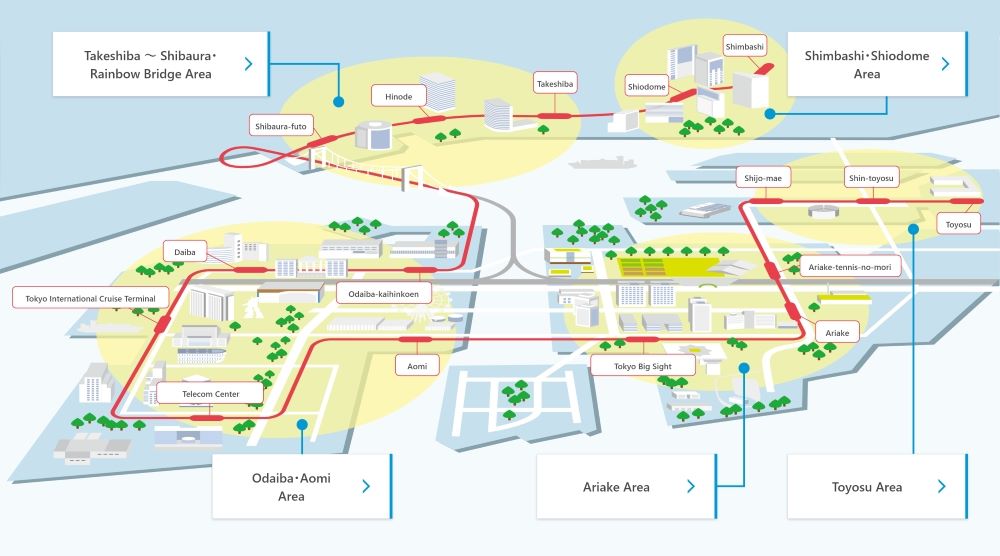
The line gives great access to many of Tokyo’s best attractions. Here’s a list of what you can access from each station on the line
| Station Name | Nearby Attractions |
|---|---|
| Shimbashi | Shiodome, Hama Rikyu Gardens, SL Square |
| Shiodome | Shiodome Sio-Site, Nippon Television Tower, Caretta Shiodome |
| Takeshiba | Takeshiba Passenger Ship Terminal, Kyu-Shiba Rikyu Gardens |
| Hinode | Hinode Pier, Tokyo Cruise Ship Terminal, Hama Rikyu Gardens |
| Shibaura-futō | Tokyo Port Museum, Shibaura-futo Park |
| Odaiba-kaihinkōen | Odaiba Marine Park, Statue of Liberty, Aqua City Odaiba |
| Daiba | |
| Tokyo International Cruise Terminal | Tokyo Cruise Ship Terminal, Odaiba Beach & Seaside Park |
| Telecom Center | Telecom Center Observatory, Miraikan (National Museum of Emerging Science and Innovation) |
| Aomi | DiverCity Tokyo Plaza, Zepp Tokyo. |
| Tokyo Big Sight | Tokyo Big Sight, Ariake Arena, Ariake Tennis Park |
| Ariake | Ariake Coliseum, Tokyo Fashion Town Building, Ariake Garden |
| Ariake-Tennis-no-mori | Ariake Tennis Forest Park |
| Shijō-mae | Toyosu Market, Toyosu Park |
| Shin-toyosu | Toyosu Gururi Park, Shin-toyosu Brillia Running Stadium |
| Toyosu | Toyosu Lalaport, Gas Science Museum, Toyosu Park |
History Of The Yurikamome Line
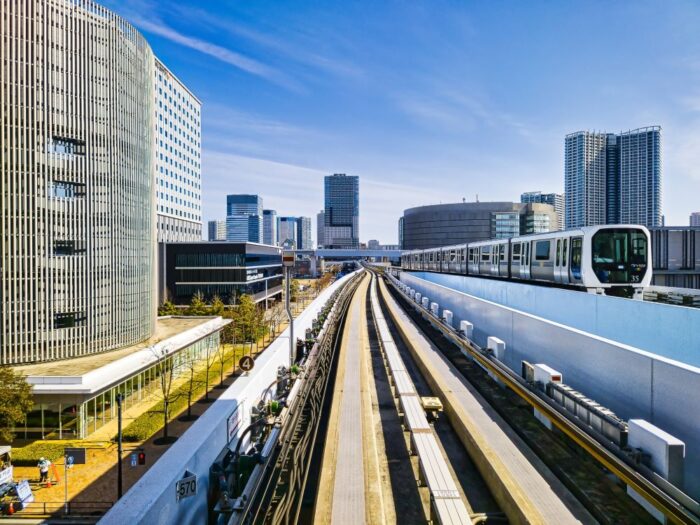
The Yurikamome Line first opened in 1995 and has since become a popular mode of transportation for all. The line was initially built to connect the central Tokyo area with the Rinkai waterfront area, which was built on reclaimed land in Tokyo Bay. Since its opening, it has undergone several expansions to better serve the growing population and increasing demand.
One of the most notable expansions occurred in 2006 when the Ariake-Toyosu stretch of the line was opened. This expansion allowed for easier access to the popular Odaiba area, which is known for its shopping centers, amusement parks, and beach.
The Line is also known for its unique station announcements. The stations employ the voices of various voice actors known for their work in anime and movies, which adds a touch of fun and excitement to the daily commute.
Today, the Yurikamome Line continues to be a reliable and convenient mode of transportation for those traveling throughout Tokyo. With its automated guideway transit system and sleek design, the Yurikamome Line is a true testament to Tokyo’s innovative spirit and dedication to modernization.
Future Developments
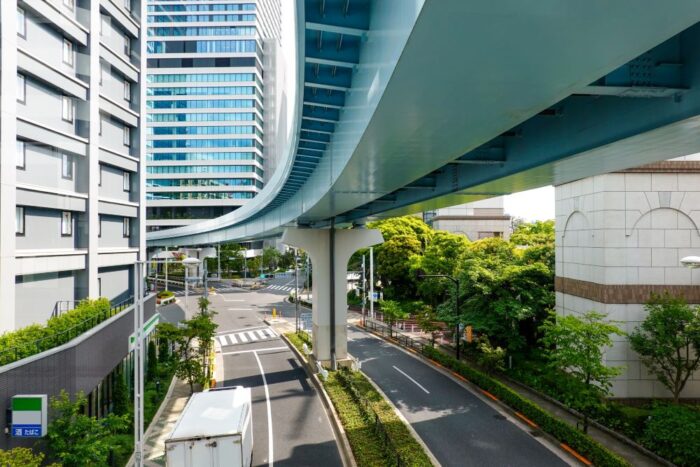
As the Yurikamome Line continues to grow in popularity, there are several future developments in the works to make it even more convenient and efficient for commuters and visitors alike.
One of the most exciting developments is the extension of the line to connect with the Tokyo Bay Aqua-Line, a toll road and bridge that connects Kawasaki and Kisarazu. This extension will make it easier for travelers to access the popular tourist destinations of Kamakura and Enoshima.
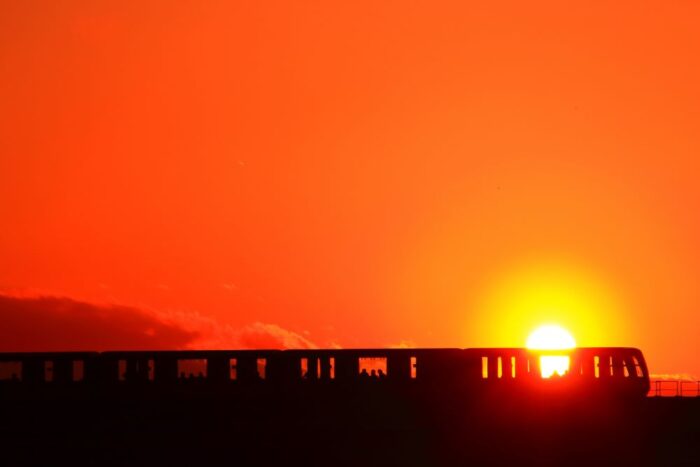
In addition, plans are underway to upgrade the existing train sets and stations to improve capacity and comfort. This includes the addition of more carriages to the trains, as well as the installation of new seating and lighting.
Finally, Yurikamome Inc. is exploring the possibility of expanding the line to connect with other parts of Tokyo, including Shibuya and Shinjuku. While these plans are still in the early stages, they have the potential to make the Yurikamome Line an even more integral part of Tokyo’s transportation network.
Where To Stay In Tokyo
Tokyo visitor levels are currently at an all-time high so make sure to book your hotels early. Tip most hotels booked with booking.com have free cancelation so book as soon as you know your date and you can always cancel if you change your mind.

